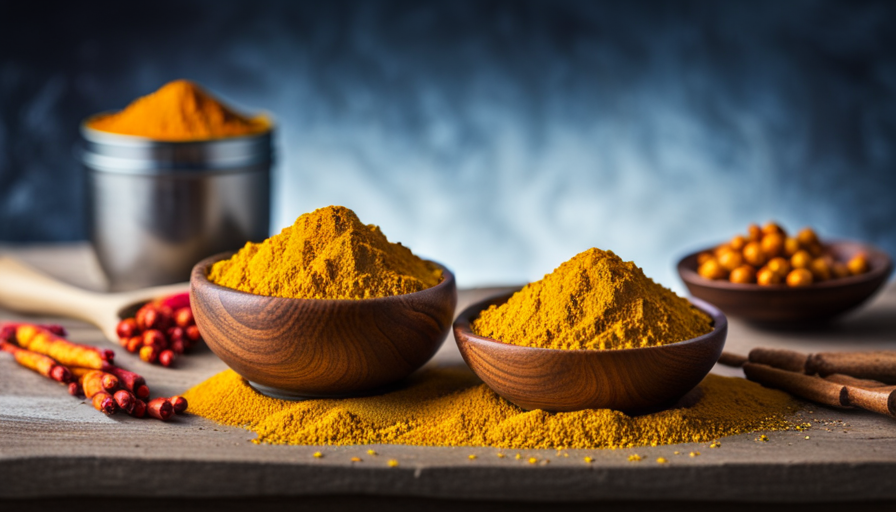Being someone who prioritizes health, I constantly search for natural solutions to enhance my well-being. Not too long ago, I discovered an effective mixture that’s becoming well-regarded within the health community – lemon ginger turmeric tea. This beverage brings together three powerful components that have a long history of use in ancient healing practices for addressing a wide range of health issues.
In this article, I will explore the benefits of lemon ginger turmeric tea and how you can make it at home.
Firstly, let’s break down what each ingredient brings to the table. Ginger is known for its anti-inflammatory properties and may help alleviate pain and discomfort caused by conditions such as arthritis or menstrual cramps. Turmeric contains a compound called curcumin, which has potent antioxidant and anti-inflammatory effects. It is believed to support brain function, reduce the risk of heart disease, and even prevent cancer growth. Finally, lemon is packed with vitamin C and antioxidants that can boost your immune system and promote healthy skin.
Together, these three ingredients create a powerhouse blend that can provide numerous health benefits when consumed regularly.
Key Takeaways
- Lemon ginger turmeric tea can improve overall well-being and has numerous health benefits.
- The tea is a natural remedy that can alleviate gastrointestinal issues, reduce stress levels, and improve skin health.
- Regular consumption of the tea can promote proper digestion, nutrient absorption, and aid in stress relief.
- Customizing the tea with ingredients such as honey, mint leaves, and cinnamon can provide additional health benefits and unique flavors.
What is Lemon Ginger Turmeric Tea?
You’re probably wondering, what exactly is lemon ginger turmeric tea and why should you try it? Well, to put it simply, this tea is a delicious blend of three powerful ingredients – lemon, ginger, and turmeric.
Lemon provides a refreshing citrus flavor while ginger adds a spicy kick. Turmeric gives the tea its bright yellow color and is known for its anti-inflammatory properties.
There are various ways to prepare this tea depending on your taste preferences. Some recipes add honey or cinnamon for sweetness while others include black pepper to enhance the absorption of turmeric’s benefits. You can also adjust the amount of each ingredient based on your liking.
Now that you know what lemon ginger turmeric tea is, let’s talk about its benefits. One major advantage is that all three ingredients have anti-inflammatory properties which may help with chronic pain and inflammation-related diseases such as arthritis. Ginger has been found to relieve nausea and aid in digestion while lemon is high in vitamin C which boosts immune function. Additionally, studies have shown that curcumin – the active compound in turmeric – may have potential cancer-fighting properties.
With all these health benefits packed into one delicious cup of tea, it’s no wonder why more people are turning to lemon ginger turmeric as a natural way to boost their wellbeing without compromising on taste or enjoyment. Speaking of health benefits, let’s dive deeper into how ginger can improve our health next!
The Health Benefits of Ginger
As I take a sip of my lemon ginger turmeric tea, the warmth and aroma fill me with a soothing sensation. Ginger is one of the key ingredients in this delicious beverage, and it offers numerous health benefits. Apart from its use in cooking, ginger supplements are becoming increasingly popular for their potential health benefits.
Ginger has been used as a traditional medicine for centuries due to its anti-inflammatory properties. It contains compounds called gingerols and shogaols, which have powerful antioxidant effects that can help protect against cellular damage caused by free radicals. Ginger is also known to aid digestion by reducing nausea and stomach upset.
Apart from its medicinal properties, ginger adds flavor and aroma to food making it an essential ingredient in many cuisines around the world. From stir-fries to curries to baked goods, ginger brings a unique zing that enhances the taste of any dish. For those seeking additional health benefits beyond culinary uses, there are various forms of ginger supplements available on the market that offer varying doses of its active compounds.
As I finish my cup of lemon ginger turmeric tea, I am reminded of how beneficial each ingredient is for my overall well-being. While ginger provides anti-inflammatory and digestive benefits as well as being an essential ingredient in cooking, next up we will explore how turmeric further enhances this beverage’s healing properties.
The Health Benefits of Turmeric
Get ready to discover how turmeric can take your health and wellness to the next level in this powerful beverage. Turmeric is a root that’s been used for centuries in traditional medicine. It contains a compound called curcumin, known for its anti-inflammatory properties.
Studies have shown that curcumin can help reduce inflammation in the body, beneficial for conditions such as arthritis and heart disease. Turmeric supplements are also widely available and have been found to be effective in reducing inflammation. However, it’s important to talk to your healthcare provider before taking any new supplements, especially if you’re taking medication or have any underlying health conditions.
Additionally, incorporating turmeric into your diet through recipes such as turmeric tea or adding it to soups and stews can also provide health benefits. Incorporating turmeric into your daily routine can be an easy way to boost your overall health and well-being. The benefits of this powerful root are numerous, from reducing inflammation to improving brain function. And when combined with other ingredients like ginger and lemon, it creates a delicious and nutritious beverage that you’ll want to enjoy every day!
Speaking of lemon, let’s dive into the next section about its own amazing health benefits without missing a beat.
The Health Benefits of Lemon
When life gives you lemons, it’s time to start enjoying the many health-boosting properties of this citrus fruit in your diet. Lemon water is a popular beverage that can help improve digestion, boost immunity, and aid weight loss.
Drinking warm lemon water on an empty stomach can also help detoxify your body by flushing out toxins and impurities. Lemons are high in vitamin C, which acts as a powerful antioxidant to protect cells from damage caused by free radicals. This can reduce the risk of chronic diseases such as heart disease and cancer.
Additionally, lemon juice contains citric acid that can help prevent kidney stones by increasing urine volume and pH levels. Another way to incorporate lemons into your diet is through a lemon detox. This involves drinking a mixture of lemon juice, water, and other ingredients for several days to cleanse the body and promote weight loss.
While there is limited scientific evidence to support the effectiveness of this method, some people swear by its benefits. Now that we’ve explored the health benefits of lemons, let’s move onto how we can combine them with ginger and turmeric to make an even more potent tea for our well-being.
How to Make Lemon Ginger Turmeric Tea
You won’t believe how easy it is to whip up a delicious and healthy concoction of zesty, spicy, and earthy flavors with just a few simple ingredients. To start making lemon ginger turmeric tea, you’ll need fresh ginger root, ground turmeric, lemon juice, honey or maple syrup (optional), and water.
Begin by grating the ginger into a pot of boiling water, then add in the ground turmeric and let simmer for 5-10 minutes. After that’s done steeping, strain out the grated ginger and stir in the lemon juice and sweetener if desired.
Tea brewing can vary depending on personal preferences – some may prefer to leave the grated ginger in for a stronger flavor while others may remove it early on for a milder taste. Additionally, one can experiment with different flavor variations such as adding cinnamon or cayenne pepper to give it an extra kick.
The beauty of this tea is that it’s versatile enough to cater to individual tastes. Now that you know how easy it is to make lemon ginger turmeric tea with various flavor options available to suit your liking, let’s move onto when you should drink this magical tonic.
When to Drink Lemon Ginger Turmeric Tea
Indulging in a warm cup of this invigorating beverage can be a delightful way to start your day or to unwind after a long one. But when is the best time to drink lemon ginger turmeric tea? Here are some preparation tips and optimal times for sipping on this tasty tea.
-
Best time: Morning – This tea is an excellent way to start your day, as it helps boost your immune system, increases metabolism, and provides energy for the rest of the day.
-
Preparation Tips: To make this tea, slice fresh ginger root and turmeric into thin pieces and add them to boiling water with some lemon juice. You can also add honey or agave nectar for sweetness.
-
Best time: Afternoon – If you need an afternoon pick-me-up without resorting to caffeine, lemon ginger turmeric tea is perfect! It can help reduce stress levels and improve digestion after lunch.
-
Preparation Tips: Brew a large batch of this tea in advance so that you can easily reheat it throughout the day whenever needed. Simply store it in a thermos or insulated container until ready to drink.
Drinking Lemon Ginger Turmeric Tea at specific times of day has numerous health benefits that shouldn’t be overlooked! Additionally, there are even more advantages associated with consuming this tea regularly that we’ll explore further in the following section.
Additional Health Benefits
I’m excited to delve deeper into the additional health benefits of lemon ginger turmeric tea.
One of the significant advantages is its positive impact on digestive health. It can help alleviate gastrointestinal issues such as bloating and indigestion.
Moreover, this tea is known for its stress-relieving properties. Due to its anti-inflammatory compounds, it helps reduce cortisol levels in the body, ultimately aiding in relaxation.
Lastly, consuming lemon ginger turmeric tea may improve skin health. It combats inflammation and promotes healthy circulation.
Digestive Health
Improving digestive health can be facilitated by regularly drinking lemon ginger turmeric tea. In addition to its anti-inflammatory properties, the combination of these three ingredients promotes a healthy gut by aiding in digestion and reducing bloating.
Turmeric, a natural anti-inflammatory agent, helps alleviate inflammation in the digestive tract while ginger stimulates the production of digestive juices. Meanwhile, lemon’s acidity helps regulate stomach acid levels and supports the liver in removing toxins from the body.
While probiotic supplements and high fiber foods are also known to promote digestive health, incorporating lemon ginger turmeric tea into your daily routine can further enhance your gut’s overall wellbeing. The active compounds found in each ingredient work together synergistically to support proper digestion and nutrient absorption.
By regularly consuming this tea, you may experience less discomfort after meals and find that your bowel movements become more regular.
Incorporating stress relief techniques is also essential for maintaining optimal gut health as stress can impact digestion negatively. Therefore, it’s crucial to prioritize relaxation practices alongside regular consumption of lemon ginger turmeric tea for maximum digestive benefits.
Stress Relief
As we’ve learned in the previous subtopic, lemon ginger turmeric tea can support digestive health. But did you know that this powerful elixir can also aid in stress relief?
In today’s fast-paced world, it’s common to feel overwhelmed and anxious. However, incorporating lemon ginger turmeric tea into your daily routine can help alleviate these feelings. One way to maximize the stress-reducing benefits of this tea is by pairing it with meditation techniques or relaxation exercises.
Here are some examples:
- Mindful breathing: Take a few deep breaths while sipping on your tea. Focus on each inhale and exhale, allowing yourself to relax more deeply with every breath.
- Progressive muscle relaxation: As you drink your tea, consciously release any tension in your body. Start at the top of your head and work down to your toes, tensing and then relaxing each muscle group one at a time.
By practicing these simple techniques while enjoying a cup of lemon ginger turmeric tea, you’ll be able to unwind and de-stress naturally. With less anxiety weighing on your mind and body, you’ll be better equipped to tackle whatever challenges come your way.
Moving forward into our next section about skin health…
Skin Health
Maintaining healthy skin is crucial, as our skin cells replace themselves every 28 days, and according to the American Academy of Dermatology, one in five Americans will develop skin cancer in their lifetime. Lemon ginger turmeric tea can provide benefits for maintaining healthy skin through both topical use and dietary supplements.
The high levels of antioxidants found in turmeric and ginger can help protect the skin from damage caused by free radicals, while lemon juice can improve collagen production, which helps keep the skin firm and elastic. Topical use of lemon ginger turmeric tea may also provide relief for certain skin conditions such as acne and eczema.
Applying a diluted mixture directly onto affected areas can reduce inflammation and redness, while the antibacterial properties of ginger and turmeric can help prevent breakouts. Additionally, consuming lemon ginger turmeric tea regularly as a dietary supplement can promote overall health and wellness, leading to healthier-looking skin. However, despite its numerous benefits, it’s important to note that there may be potential side effects associated with consuming large amounts of these ingredients or using them topically without proper dilution or consultation with a healthcare professional.
With this in mind, let’s explore some potential side effects that should be taken into consideration when incorporating lemon ginger turmeric tea into your routine.
Potential Side Effects
Beware of the possible side effects of lemon ginger turmeric tea, as they can cause discomfort and undermine your experience with this otherwise beneficial beverage. Although these side effects are rare, it’s important to be aware of them before consuming the tea. Here are three potential risks to keep in mind:
-
Managing Risks: Turmeric has blood-thinning properties that may interfere with certain medications or medical conditions. If you’re taking any medication, particularly blood thinners or diabetes medication, consult with your doctor before drinking this tea.
-
Allergy Concerns: Ginger and turmeric belong to the same family of plants and may trigger allergic reactions in some people. Symptoms of an allergy may include skin rash, itching, swelling, or difficulty breathing. Discontinue use if you experience any adverse reactions.
-
Digestive Issues: Some people may experience digestive issues such as bloating, gas, diarrhea, or stomach upset after consuming large amounts of ginger or turmeric. Start with a small amount of tea and gradually increase the dosage to avoid these side effects.
It’s important to note that these side effects are not common and most people can safely enjoy lemon ginger turmeric tea without any issues. However, if you have concerns about potential risks or allergies, it’s always best to consult with a healthcare professional before adding the beverage into your daily routine.
Moving on from discussing the potential side effects of lemon ginger turmeric tea, variations offer an exciting way to add variety to your experience while also reaping additional health benefits.
Lemon Ginger Turmeric Tea Variations
Try spicing up your tea experience with these various lemon ginger turmeric tea blends, adding different flavors such as honey, cinnamon, or mint to tantalize your taste buds. Turmeric tea recipes can be customized to suit individual preferences and health needs. For example, adding a teaspoon of raw honey not only enhances the sweetness but also provides antimicrobial and anti-inflammatory benefits.
Another variation is to add fresh mint leaves to the mix. Mint has been shown to have antioxidant properties that can help protect against oxidative damage in the body. Additionally, it has a refreshing taste that complements the spicy notes of ginger and turmeric.
Cinnamon is another popular ingredient that can be added to this tea blend for an extra boost of flavor and health benefits. Cinnamon has been found to lower blood sugar levels and improve insulin sensitivity, making it particularly beneficial for individuals with diabetes or those at risk for developing the disease. Overall, there are many ways to customize your lemon ginger turmeric tea recipe while reaping all of its wonderful health benefits!
| Ingredient | Health Benefits | Flavor Profile |
|---|---|---|
| Honey | Antimicrobial & Anti-inflammatory properties | Sweet |
| Fresh Mint Leaves | Antioxidant properties & Refreshing Taste | Cool & Spicy |
| Cinnamon | Lowers Blood Sugar Levels & Improves Insulin Sensitivity | Warm & Spicy |
When it comes to lemon ginger turmeric tea variations, there are numerous options available that cater towards specific tastes and nutritional needs. Adding ingredients such as honey, mint leaves or cinnamon offer unique flavors while providing additional health benefits on top of what is already offered by ginger lemon tea benefits. So go ahead and experiment with different combinations until you find one that satisfies both your taste buds and wellness goals!
Frequently Asked Questions
Can Lemon Ginger Turmeric Tea help with weight loss?
I’ve found that drinking lemon ginger turmeric tea can be a helpful addition to my weight management routine. While it’s not a miracle solution, the combination of these three ingredients can provide a metabolic boost and aid in digestion, which can ultimately support weight loss efforts.
Additionally, turmeric has been shown to have anti-inflammatory properties, which may also contribute to overall health and well-being. However, it’s important to note that incorporating this tea into a healthy diet and exercise plan is essential for seeing results.
Is Lemon Ginger Turmeric Tea safe to drink while pregnant?
Well, isn’t it just great that during such a special time in my life, I have to worry about the safety of every single thing I consume?
As for lemon ginger turmeric tea, let me tell you this – safe consumption is key. While there isn’t enough research on the effects of this tea on pregnancy, it’s best to err on the side of caution and avoid it altogether or consult with a healthcare professional before consuming.
Don’t worry though – there are plenty of alternative options that are deemed safe during pregnancy, such as ginger tea or peppermint tea. It’s important to prioritize the health and well-being of both myself and my unborn child.
How much Lemon Ginger Turmeric Tea should I drink per day?
When it comes to drinking lemon ginger turmeric tea, the daily intake can vary depending on your preferences and needs. Generally speaking, a cup or two per day is considered safe for most people. However, if you have any health concerns or are pregnant, it’s best to consult with your doctor before consuming this tea regularly.
When brewing this tea, it’s important to use fresh ingredients and boil the water first before adding them in. Steep the mixture for about 5-10 minutes and enjoy!
Overall, lemon ginger turmeric tea can be a flavorful addition to your daily routine with potential health benefits, but moderation is key.
Can Lemon Ginger Turmeric Tea help with digestion issues?
Personally, I’ve found that lemon ginger turmeric tea has been incredibly helpful in improving my digestive health.
The digestive benefits of this particular tea are vast and varied.
Ginger is known to soothe an upset stomach and reduce inflammation in the gut, while turmeric contains curcumin which has been shown to alleviate symptoms of irritable bowel syndrome (IBS) and other digestive issues.
Lemon also aids in digestion by stimulating the production of bile in the liver, which helps to break down fats and improve overall gut health.
All together, these ingredients work synergistically to provide a powerful boost to your digestive system.
So if you’re looking for a natural way to improve your gut health, I highly recommend trying out some lemon ginger turmeric tea!
Can Lemon Ginger Turmeric Tea help with reducing inflammation in the body?
Reducing inflammation and boosting immunity are two potential benefits of lemon ginger turmeric tea.
Turmeric contains curcumin, a compound with anti-inflammatory properties that may help reduce inflammation in the body.
Ginger also has anti-inflammatory effects and can boost the immune system by increasing the production of certain white blood cells.
Lemon is high in vitamin C, which plays a crucial role in supporting immune function.
While more research is needed to fully understand the extent of these benefits, incorporating lemon ginger turmeric tea into your diet may be a simple way to support overall health and wellness.
Conclusion
Overall, I highly recommend incorporating lemon ginger turmeric tea into your daily routine for its numerous health benefits. This tangy and warming drink is a powerful combination of anti-inflammatory, antioxidant, and immune-boosting ingredients. It can help improve digestion, relieve pain and inflammation, prevent chronic diseases, and support overall wellness.
Whether you prefer it hot or iced, with honey or without sweeteners, there are endless ways to customize this tea to suit your taste buds. So don’t hesitate to give it a try and savor the soothing sensation of lemon ginger turmeric tea on your body and mind.
Remember – a little cup of this golden elixir could go a long way in keeping you healthy and happy!










